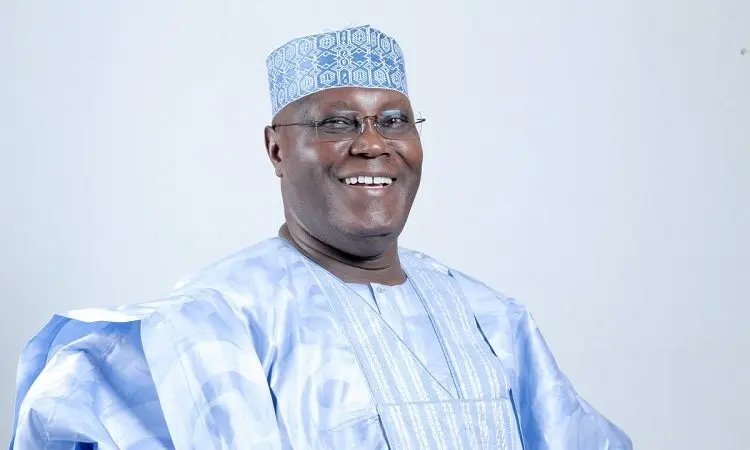When he first tried to become President of the Federal Republic in 1993, Atiku Abubakar was only an emerging phenomenon on the political scene, a top associate of the then dominant figure on the political scene, Major General Shehu Yar’adua. As an SDP aspirant, Atiku was leading the race to become Governor of Gongola State in 1991. He was dealt two blows. IBB split the state into two in August that year, so Atiku handed over his campaign structures in the new Taraba State to his campaign manager, Reverend Jolly Nyame. While Nyame went on to become governor, Atiku was disqualified by the Babangida regime, through Prof Humphrey Nwosu’s National Electoral Commission [NEC], for undisclosed reasons.
A year and a half later, at SDP’s Jos convention, Atiku was the Yar’adua-backed presidential aspirant, fielded against two much more prominent aspirants, Chief M.K.O. Abiola and Ambassador Babagana Kingibe. Atiku came third in the first round of the election, though the tallies of Abiola, Kingibe and himself were very close. With great difficulty, Yar’adua then threw his weight behind Abiola in the run-off election even though he accused Abiola’s South Western supporters of betraying an agreement by deliberately under voting for Atiku in the first round [the rule then was for each delegate to vote for three aspirants in the first round].
When Abiola won the ticket, he again reneged on his promise to pick Atiku as his running mate, preferring instead to pick Kingibe, who had the backing of most SDP state governors. Atiku too didn’t want to be running mate until Yar’adua insisted, and was probably glad when he was eventually not picked.
In 1999 however, he readily agreed to be Chief Obasanjo’s running mate. He even abandoned his governorship election victory in Adamawa State and took up the offer, clumsy though it was because the freshly nominated PDP presidential candidate Obasanjo asked him, “Can you take orders from me?” Atiku said yes, and off they went to victory.
He should have been a shoo-in to succeed Obasanjo in 2007 except for may unsavoury happenings in the years in-between. At first Obasanjo and Atiku were the most compatible power duo, and Obasanjo probably saw him as a reincarnation of Yar’adua, with whom he had a most cordial relationship as his deputy when he was military Head of State in the 1970s. Atiku was an extremely visible and very influential vice president during Obasanjo’s first four years as president. The first signs of a crack appeared in 2002 when, as Obasanjo prepared to launch his re-election bid, his team led by Chief Tony Anenih removed Atiku’s picture from the “Obasanjo/Atiku 2003” posted, suggesting that he could be dropped as running mate.
As soon as he won re-election in 2003, Obasanjo moved to cripple his Vice President. Listening to Atiku over the years, it had to do with Obasanjo’s tenure elongation bid, which Atiku openly opposed. At one point, Obasanjo’s aides declared Atiku’s seat vacant because he decamped to Action Congress in 2007 and became its presidential candidate. Backed to the hilt, ironically, by then Lagos State Governor Bola Tinubu, his possible opponent in the upcoming election.
Atiku finished third in the 2007 election, behind Umaru Yar’adua and ANPP’s Muhammadu Buhari, having dodged many legal and political hurdles that Obasanjo threw in his way.
He tried again in 2011. That year, a committee of Northern elders led by Malam Adamu Ciroma sat down and produced a consensus choice among the Northern aspirants. Atiku got 4 of their seven votes. Quite remarkably, the other aspirants stood down, including General Ibrahim Babangida and Kwara State Governor Bukola Saraki. He however lost the PDP nomination to then President Goodluck Jonathan, though he garnered over 800 delegate votes at the Abuja convention.
He tried again in 2015, again with little success. This time Atiku finished third at APC’s Lagos Convention, behind Buhari and then Kano State Governor Rabi’u Kwankwaso. Two years later he pulled out of APC and returned to PDP. In 2018 he clinched PDP’s presidential ticket at its Port Harcourt Convention, in a field of 12 all-Northern aspirants. It was a remarkable win because the host, Rivers State Governor Nyesom Wike, controlled the PDP national executive and threw his weight behind Sokoto State Governor Aminu Tambuwal, who finished second to Atiku. Atiku however lost the 2019 election to APC’s Buhari.
This time he appears to be stronger than ever, despite advancing age. At PDP’s convention last Saturday, Atiku handily defeated 15 other aspirants, including the insurgent aspiration of Governor Wike. If Atiku Abubakar can somehow heal the wounds and overcome the grievances of his losing opponents as well as agitators for power shift to the South, then PDP stands a much better chance of winning next year’s election than it did in 2019.
There are three vital steps, however, before that happens. One is Atiku’s choice of a running mate, which could alienate many of the PDP men and women eagerly seeking the post. The second one is to solidify PDP’s support base in the South. Ironically, PDP has more support in the South than it has in the North, which makes the matter tricky for a Northern candidate. Finally, Atiku must hope for an implosion in APC, which has more support in the North than in the South. His hope must be that millions of Northern voters will be alienated by APC’s choice of presidential candidate and or running mate and vote for him. We will see if any of that happens.









